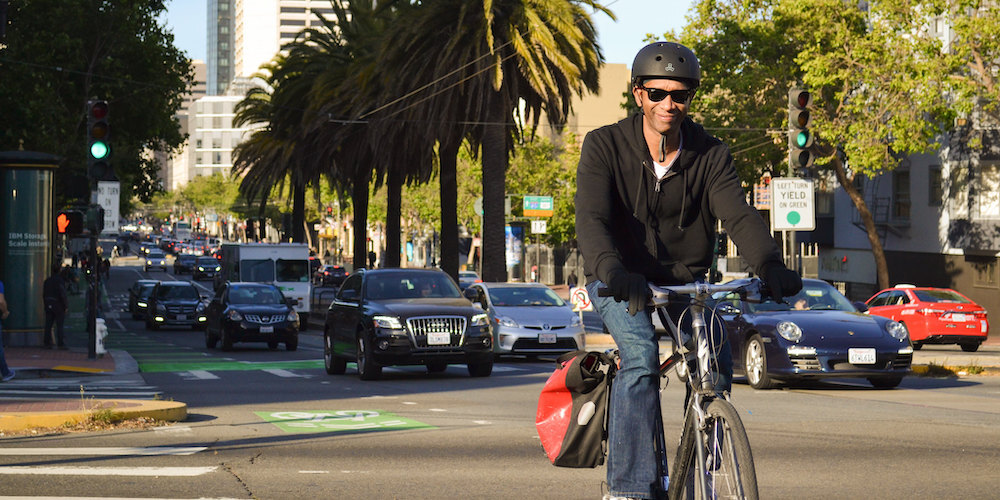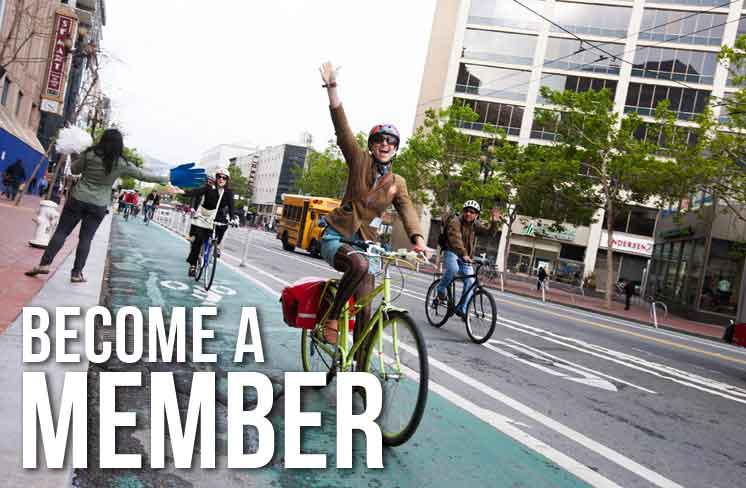SF Bike had a busy 2023 supporting legislation that makes streets safer for pedestrians and people on bikes and bring San Francisco closer to its Vision Zero goals. We’re excited to share that several of these bills have passed, and here’s what you can expect to see in 2024.
Let’s start with the Omnibus Bicycle Bill (AB 1909) from 2022, which already created some important changes when it took effect two years ago. The 2024 update amends vehicle code so that people on bikes can legally proceed through intersections on the pedestrian walk signal (unless otherwise directed by a bicycle signal light). Prior to this amendment, it was only legal for bikes to cross the street with the green light for car traffic. People riding bikes now have the same 3-7 second headstart that pedestrians have, in intersections with Leading Pedestrian Intervals (LPIs). This amendment took effect on January 1st 2024.
More recently, in October of 2023, several bills that increase bicycle and pedestrian safety took effect.
AB 413 implements “daylighting” measures statewide – these are improvements that make everyone more visible at intersections. This bill increases pedestrian and bicycle safety as it increases visibility for people walking, biking, and driving cars around crosswalks by removing visual barriers within 20 feet of intersections. Cities are required to implement measures to address the following changes under this bill:
- Stopping, standing, or parking a vehicle within 20 feet of a crosswalk, marked or unmarked, and within 15 feets of a crosswalk with a curb extension will be prohibited.
- Cities will be able to allow parking within 20 feet of a crosswalk that has clear signage or a painted curb.
- Warnings to violators will be issued through 2024 while changes take effect.
AB 361 made important changes to enforcing parked cars in the bike lane. Under this bill, cities are authorized to install forward-facing parking control devices (read: cameras) on city-owned parking enforcement vehicles in order to better monitor and capture bicycle lane violations. Enforcement officers will be able to take still photos of bike lane parking violations until Jan 1 2030. These parking control cameras should be angled towards and solely focused on the bike lane, so that they can only capture images of parking violations, and images captured will be kept confidential under existing law.
SB 712 increased tenants rights related to personal micromobility devices, or scooters, bikes, and e-bikes. This bill prohibits landlords from preventing tenants from owning, storing and charging personal micromobility devices in the tenant’s unit if the landlord has not provided secure, long-term storage for the devices. Such storage must be free for residents’ use, located on the premises, accessible to only residents of the same housing complex, protected against precipitation, and it must have at least one standard electrical connection for each device that will be stored. Landlords can still prohibit repair or maintenance on batteries and motors within a tenant’s unit. Landlords can also still require tenants to store devices in accordance with fire codes.
We put a lot of energy towards the Automated Speed Enforcement Pilot (AB 645), and were thrilled to see the bill pass in October 2023. You can read more about this big win here, but the highlights include:
- San Francisco and five other California cities are now able to pilot automated speed cameras for five years as of January 1st, 2024.
- SFMTA is authorized to install 33 speed safety cameras around schools and along the High-Injury Network.
We’re excited for what 2024 has in store for bicycle and pedestrian safety. Review the rules of the road here and at our Smart City Cycling 1 class!


